|
|
|
Sort Order |
|
|
|
Items / Page
|
|
|
|
|
|
|
| Srl | Item |
| 1 |
ID:
091082
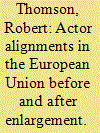

|
|
|
|
|
| Publication |
2009.
|
| Summary/Abstract |
What impact has the 2004 enlargement had on legislative decision making in the European Union (EU)? This study answers this question by examining the controversies raised by a broad selection of legislative proposals from before and after the 2004 enlargement. The analyses focus on the alignments of decision-making actors found on those controversies. Member State representatives, the European Commission and the European Parliament vary considerably in the positions they take on controversial issues before and after enlargement. Consistent patterns in actor alignments are found for only a minority of controversial issues. To the extent that consistent patterns are found, the most common involve differences in the positions of Northern and Southern Member States and old and new Member States. The North-South alignment was more common in the EU-15 and reflected Northern Member States' preference for low levels of regulatory intervention. The new-old alignment that has been evident in the post-2004 EU reflects new Member States' preference for higher levels of financial subsidies. This study argues that the persistent diversity in actor alignments contributes to the EU's capacity to cope with enlargement.
|
|
|
|
|
|
|
|
|
|
|
|
|
|
|
|
| 2 |
ID:
157142


|
|
|
|
|
| Summary/Abstract |
The development of EU space policy and its two main programmes, Galileo and Copernicus, has necessitated a parallel process of legitimization of this policy. Popularization, defined as the simplification of a policy in order to be made accessible to the masses and accepted by them, has been a core legitimising tool in the hands of the European Commission, with regular help from experts/industrialists, or ‘organic intellectuals’. After establishing popularization conceptually, the analysis illustrates instances of both expert-based and non-expert-based popularization at the Brussels level. It concludes that the process of popularization conceals the most controversial aspects of both Galileo and Copernicus while also producing a ‘general interest’ that glues together a disparate set of social forces, in favour of EU space programmes and their manufacturers - the European space industry.
|
|
|
|
|
|
|
|
|
|
|
|
|
|
|
|
| 3 |
ID:
101138
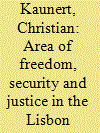

|
|
|
|
|
| Publication |
2010.
|
| Summary/Abstract |
Scholars may rightly claim the European Union's (EU) area of freedom, security and justice (AFSJ) has become one of the most significant developments in the European integration process. The Lisbon Treaty (LT) has the potential to push the AFSJ towards tremendous growth, and has provided the policy area with instruments that were unthinkable after the third pillar was created during the Maastricht Treaty negotiations. This article investigates the role of the European Commission in the process of constructing an 'AFSJ'. It argues that the Commission (through alliances with other institutional actors) managed to incrementally contribute to this shift in political norms. This shift derived from the policy-making level from 1999 onwards. It manifested itself specifically during the negotiations of the Constitutional Treaty (CT) and the subsequent re-negotiation of the LT. Here, the Commission acted with the support and the use of other supranational actors during the Convention, without which this result would have been difficult, if not impossible, to obtain. Firstly, the article will deal with the main advances of the CT which resulted in the LT. Subsequently, the role of the Commission and other EU institutional actors will be examined, resulting in an overall evaluation.
|
|
|
|
|
|
|
|
|
|
|
|
|
|
|
|
| 4 |
ID:
117353
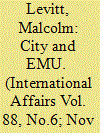

|
|
|
|
|
| Publication |
2012.
|
| Summary/Abstract |
This article examines four elements of City of London thinking related to Economic and Monetary Union (EMU) and European financial regulation, and includes previously unpublished material.
City opinion on EMU and prospective UK membership has been divided. Sceptics have rightly stressed the risks facing a monetary union of disparate economies without a robust fiscal framework, but naively believed that threats to the City from EMU members could not arise because of the rules of the single market. Enthusiasts wilfully neglected the economic risks but emphasized the regulatory threats to City competitiveness if the UK were outside. The UK regulatory philosophy stressing freedom for cross-border competition and light regulation of financial markets was never accepted by many continental member states, numerous impediments to competition persisted and potentially damaging attempts were made to exclude the City from key financial and legal provisions on the grounds that the UK was not participating in EMU. Being at the negotiating table averted those threats, but now goodwill has levelled off and the liberal regulatory philosophy is in retreat. Despite reservations about EMU, City institutions made crucial but little-known contributions to the practical implementation of the euro, stressing the scale and nature of the tasks of converting banking IT systems, the logistics of changing notes and coins and the need for legal certainty. They helped to persuade the European Commission to accept the phased introduction of the euro and the legal framework.
Now EMU faces an existential threat and the financial system faces more regulation at EU and UK levels. The position taken by the UK at the December 2011 European Council, ostensibly defending the City but risking marginalization, dismayed many City figures who would be more willing to compromise to preserve access to the single market-but Eurosceptic hedge funds, the least regulated financial sector, retain considerable lobbying power.
|
|
|
|
|
|
|
|
|
|
|
|
|
|
|
|
| 5 |
ID:
089539


|
|
|
|
|
| Publication |
2009.
|
| Summary/Abstract |
The thrust of the article is to investigate the reasons for the ambiguous character and results of the ENP. The argument is that these are a result of tensions inherent in the discourses produced at various sites in the EU that are involved in the development and implementation of the Policy. These tensions result in the simultaneous construction of mutually exclusive types of borders at the external edges of the EU. The main contribution of the present study to this argument is the detailed empirical evidence it provides for these tensions through the examination of the discourse of the European Commission. The article introduces the concept of soft/ hard borders as a very good analytical tool for studying the ENP and conducts a double-reading of the major types of Commission documents related to this Policy. The main finding is that at present some of the main hurdles the ENP is facing are a result of insufficient transformation of the assumptions and routinised practices that guide policy-making. These lead to underlying themes in Commission discourse that preclude the establishment of the necessary soft external border for the EU. Instead they promote the construction of more traditional hard borders.
|
|
|
|
|
|
|
|
|
|
|
|
|
|
|
|
| 6 |
ID:
148337
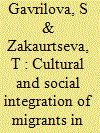

|
|
|
|
|
| Summary/Abstract |
IN 2014-2016, a migration crisis loomed large in the discussions held by the European Commission (EC) and the governments of the EU member states. Migration and its consequences sparked a massive public outcry in Europe. According to the polls carried out by the Standard Eurobarometer back in 2013, the Europeans started to give higher priority to migration problems than to issues such as taxes, pensions, education, and even terrorism, and in 2015, the problem was already second on the list of their priority concerns after unemployment. The Eurobarometer records for 2015 underline that resolving problems related to the growth of migration became a priority task for both various European institutions and national governments.1 In conditions of a complicated social and economic situation, authorities of the EU member states encounter problems when trying to explain to their populations a need to provide employment to migrants and integrate them in the economy.2 A growing public discontent with the mass influx of illegal migrants gave rise to an increased growth of nationalist and anti-EU sentiments in many EU countries. Characteristically, political parties speculating on the Islamic factor have bolstered their influence, while a "radicalization of public opinion which has been continuously growing in the past few years contradicts the fundamental goals of the European integration."
|
|
|
|
|
|
|
|
|
|
|
|
|
|
|
|
| 7 |
ID:
127060
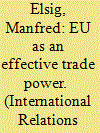

|
|
|
|
|
| Publication |
2013.
|
| Summary/Abstract |
Drawing on the European Union (EU) foreign policy literature on effectiveness, this article studies how the European Union chooses judges to serve on the World Trade Organization's key judicial institution: the Appellate Body. Conceptually, the article differentiates between effectiveness in representation and effectiveness in impact. The article shows how delegation to the European Commission has increased the strategic agenda-setting power for championing its preferred candidates. The article further compares European and US practice in nominating candidates. Overall, the article finds that effectiveness in representation has increased over time. In terms of effectiveness in impact, the article shows how the international environment conditions the EU's influence. The article also exposes the difficulties of studying the effectiveness of EU external relations due to the peculiar decision-making processes dominant in judicial bodies.
|
|
|
|
|
|
|
|
|
|
|
|
|
|
|
|
| 8 |
ID:
137811
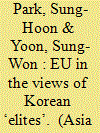

|
|
|
|
|
| Summary/Abstract |
The last two decades have seen most significant developments, which led to incremental upgrading of the Korea-EU bilateral relationship, including the adoption by the European Commission in 1993 of a strategy paper toward Korea, the presidency role played by Korea in the third Asia-Europe Meeting (ASEM) Summit in 2000 and the launch and entering into force of the bilateral free trade agreement (FTA) in 2007 and 2011, respectively, as well as the upgrading of the relationship to a strategic partnership in 2010. The imagery of the EU, however, does not seem to have improved substantially as these series of positive developments in bilateral relationship might suggest, as manifested in a few recent studies conducted on the EU perception in Asia and Korea. As an extension of the two previous interviews of Korean elites carried out in 2006 and 2009, a new round of elite interviews has been conducted to find out how the perception of the EU in the mindset of Korean elites has changed over the past years. The main findings of this paper are as follows. First, among a number of changes found in the comparative analysis of the three interviews, the bilateral FTA that appeared at the top as an immediate image of the EU in the two previous interviews lost its place substantially. Instead, the Eurozone crisis has become one of most influential EU images in the mid of Korean elites. Second, the global actorness of the EU has become substantively weakened in the eyes of the Korean elites over the past few years. As this was most strongly pronounced in the group of media representatives, the authors expect it to have lasting impacts on the images of the EU in the wider Korean public.
|
|
|
|
|
|
|
|
|
|
|
|
|
|
|
|
| 9 |
ID:
106739


|
|
|
|
|
| Publication |
2011.
|
| Summary/Abstract |
The article examines the EU's and specifically the European Commission's proposals for an external energy policy. The analysis departs from the assumption that the geographical scope of the Commission's proposals is not the result of 'geopolitical facts' but rather of a discursive policy process of geopolitical writing in which geopolitical images and ideas are constantly being created and re-created. I first examine how the Commission is constructing its vision of an integrated European energy space in theory and how it uses 'spectacular' images to justify the linkages between energy security and geography. I then distinguish between Walters's notions of 'networked' and 'colonial' type of relations between the EU and third states to examine the wider political purpose behind the Commission's vision of the European energy space. I then analyse the extent to which the Commission's geopolitical vision has been or can be implemented in practice in four concrete empirical case studies: EU energy relations with Eastern Europe, the Mediterranean/Middle East, the Caucasus and the Russian Federation.
|
|
|
|
|
|
|
|
|
|
|
|
|
|
|
|
| 10 |
ID:
181640


|
|
|
|
|
| Summary/Abstract |
European Defence is in a new and formative phase in which the European Union’s long list of defence acronyms has steadily grown. One of the most noticeable new policy initiatives is the European Commission’s European Defence Fund (EDF). This article consequently investigates and outlines the establishment of the European Defence Fund and the European Commission’s new role within the field of security and defence through the lens of revised neofunctionalism. This article thus asks how and through what steps did the EDF come about; and secondly how can neofunctionalism explain the dynamics involved in the establishment of the European Defence Fund. The analysis uses a process-tracing method and draws on interviews with relevant policymakers and officials in Brussels as well as official EU documents. The conclusions argue that the ever-increasing involvement of the European Commission in a policy field close to national sovereignty is starting to blur the traditional dichotomy between intergovernmental and supranational decision-making. In this way, this study contributes to the growing literature on the weakening of intergovernmentalism within the EU security and defence policy field.
|
|
|
|
|
|
|
|
|
|
|
|
|
|
|
|
| 11 |
ID:
078783


|
|
|
|
|
| Publication |
2007.
|
| Summary/Abstract |
The main aim of this article is to examine the role-perception and operation of European Commission officials towards Northern Ireland and the peace process. A relative gap in the theoretical literature, until recently, on the Commission's endogenous preferences is highlighted. The main conclusion is that the European Commission's preferences towards conflict resolution in Northern Ireland have altered since 1994 and that Commission officials exhibit a greater analytical understanding and proactive approach to Northern Ireland. The cause of this change has not been socialization into `European' supranational norms, but instead has reflected the impact of British and Irish cooperation and agreement.
|
|
|
|
|
|
|
|
|
|
|
|
|
|
|
|
| 12 |
ID:
126797
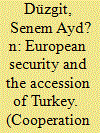

|
|
|
|
|
| Publication |
2013.
|
| Summary/Abstract |
Following a poststructuralist theorising of identity in international relations, which argues that identity is relationally and discursively constructed through foreign policy, this article attempts to analyse the way in which the European Commission discursively constructs European identit(ies) in its relations with Turkey around the theme of 'security'. The study utilises the methodological tools of critical discourse analysis in analysing the speeches and field interviews conducted with European Commission officials, in examining the way in which they construct 'Europe' in relation to the security implications of Turkish accession. The article's findings challenge the argument that Europe is moving beyond the modern state to resemble a postmodern order, and problematises the designation of the Commission as a 'cosmopolitan' actor in EU enlargement policy.
|
|
|
|
|
|
|
|
|
|
|
|
|
|
|
|
| 13 |
ID:
127512


|
|
|
|
|
| Publication |
2013.
|
| Summary/Abstract |
The envisaged future space research programmes, whether in the field of space exploration or Earth observation are becoming more and more technically complicated and so costly that a single nation can hardly afford to realize them. Major non-European space-faring nations, China and India will progressively play an important role besides US, Russia and Japan. The Space Advisory Group of the European Commission recommended that the European Commission supports within Horizon 2020 a comprehensive Robotic Mars-Exploration Programme under European leadership that should become an essential element of a coordinated international space research programme. The International Space Station (ISS) experience shows that cooperative space programmes build links between industries and laboratories from around the world, which then further develop in non-space related activities, with positive impact on the economy and scientific research. Strategies need to be developed to mitigate the gradual increasing risks incurred by climate change. In order to lower their entry barrier to engage in space emerging and developing space nations need to be included in cooperative space programmes. We present the recommendations of the Space Advisory Group of the European Commission concerning Europe's participation to global space endeavours.
|
|
|
|
|
|
|
|
|
|
|
|
|
|
|
|
| 14 |
ID:
081011


|
|
|
|
|
| Publication |
London, Routledge, 2007.
|
| Description |
xvi, 192p.
|
| Series |
UACES contemporary European studies series
|
| Standard Number |
9780415414142
|
|
|
|
|
|
|
|
|
|
|
|
Copies: C:1/I:0,R:0,Q:0
Circulation
| Accession# | Call# | Current Location | Status | Policy | Location |
| 053162 | 338.914/CAR 053162 | Main | On Shelf | General | |
|
|
|
|
| 15 |
ID:
084642


|
|
|
|
|
| Publication |
2008.
|
| Summary/Abstract |
Europeanisation is a legitimising process through which the European Union strives to gain meaning, actorness and presence internationally. However, this process continues to be described in less than complimentary ways as ambiguous, incomplete, unsettled, or impotent. We contend that it is the contradictory demands of negotiating order at the 'internal' and 'external' levels both operationally and normatively which critically affect the EU's ability to achieve presence and actorness in international affairs. In this paper we focus upon the role of the European Commission in the external projection of Europeanisation towards the Mediterranean with an emphasis upon the discursive construction, performance and survival of Europeanisation. We show the ways in which the external projection of Europeanisation produces fuzziness and messiness in which the Mediterranean emerges as both a chaotic conception and site of chaos.
|
|
|
|
|
|
|
|
|
|
|
|
|
|
|
|
| 16 |
ID:
182910
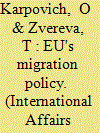

|
|
|
|
|
| Summary/Abstract |
THE development of a common EU migration policy and the approval of the new Pact on Migration and Asylum, proposed by the European Commission (EC) on September 23, 2020, is one of the most important tasks before the EC in 2021 [9]. But even if adopted, the pact would hardly be a breakthrough in efforts to solve the migration problems besetting the EU. To prove this point, we will examine the reasons for the European Commission's continued close attention to migration issues, the nature of the new proposals, and how they are perceived by politicians and the public in EU member states...
|
|
|
|
|
|
|
|
|
|
|
|
|
|
|
|
| 17 |
ID:
086747
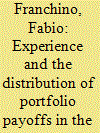

|
|
|
|
|
| Publication |
2009.
|
| Summary/Abstract |
This article tests four theories of portfolio distribution within the European Commission and assesses whether experience plays a role in the process of allocating policy responsibilities. The share of portfolios that each Member State is assigned, through its Commissioners, is strongly related to its resources and voting power, as predicted by the proportionality norm and bargaining theory, respectively. Additionally, Member States with Commissioners that have experience in the relevant portfolios are assigned shares that are significantly above what one may expect from these two theories. For half of the portfolios, Commissioners have moderate views along the dimension of the policy they manage, but appointed Commissioners also have significantly more experience in both supranational portfolios and similar national portfolios than the median Commissioner. The difference in experience in supranational and, more weakly, national portfolios significantly accounts for the difference in preference between the appointed and the median Commissioner. Finally, salience matters as well. Left/right leaning Commissioners are significantly more likely to be assigned portfolios with a left-wing/right-wing ideological profile, but this strong relation disappears for Commissioners with above average experience in the Commission, in the relevant supranational portfolios or in national governments.
|
|
|
|
|
|
|
|
|
|
|
|
|
|
|
|
| 18 |
ID:
167593


|
|
|
|
|
| Summary/Abstract |
Despite the growing debate over the European Commission’s (hereafter, Commission) role in crises, there are few systematic explanations for the variety of actions undertaken by the Commission in times of crisis. This article outlines a heuristic device to explain the Commission’s actions during crises, based on the variables ‘Commission mandate’ and ‘member state engagement’. To this end, it examines two crisis events that affected two strategically important policy areas for European Union integration: the early stages of the financial crisis that began in 2008 and the migration following the 2011 Arab Spring. Based on analysis of these cases, this study identifies four strategies applied by the Commission: doer, follower, cooperator and recycler. Our study concludes that member state engagement and Commission mandate are important variables in explaining under which circumstances these strategies are used by the Commission.
|
|
|
|
|
|
|
|
|
|
|
|
|
|
|
|
| 19 |
ID:
129207
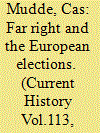

|
|
|
|
|
| Publication |
2014.
|
| Summary/Abstract |
If we are to believe the international media, this is going to be the year of the "far right anti-European populists." In the first three days of 2014, The New York Times published two opinion essays warning of the far right's rise, while The Economist focused its first issue of the year on "Europe's Tea Parties." Before this came months of public warnings of a "European populist backlash" issued by prominent European Union politicians, including the presidents of the EU, the European Commission, and the European Parliament (EP), and by national politicians, such as Italian Prime Minister Enrico Letta and Dutch Deputy Prime Minister Lodewijk Asscher. While the warnings have employed different terms and point to somewhat different groups
|
|
|
|
|
|
|
|
|
|
|
|
|
|
|
|
| 20 |
ID:
149729
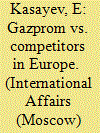

|
|
|
|
|
| Summary/Abstract |
RUSSIAN GAS sold abroad has always competed with pipeline and liquefied commodities from other suppliers. The United States announces that liquefied natural gas (LNG) will soon be exported on a large scale not only to Asia, but also to Europe. Having launched a few major LNG projects, Australia is planning in the short term to enter international markets with considerable volumes of energy products, depriving Qatar of its leadership, which it has been holding for several years among some twenty LNG exporters.
|
|
|
|
|
|
|
|
|
|
|
|
|
|
|
|
|
|
|
|
|